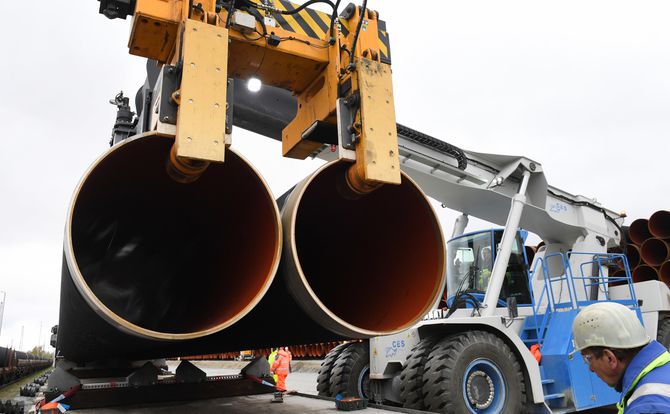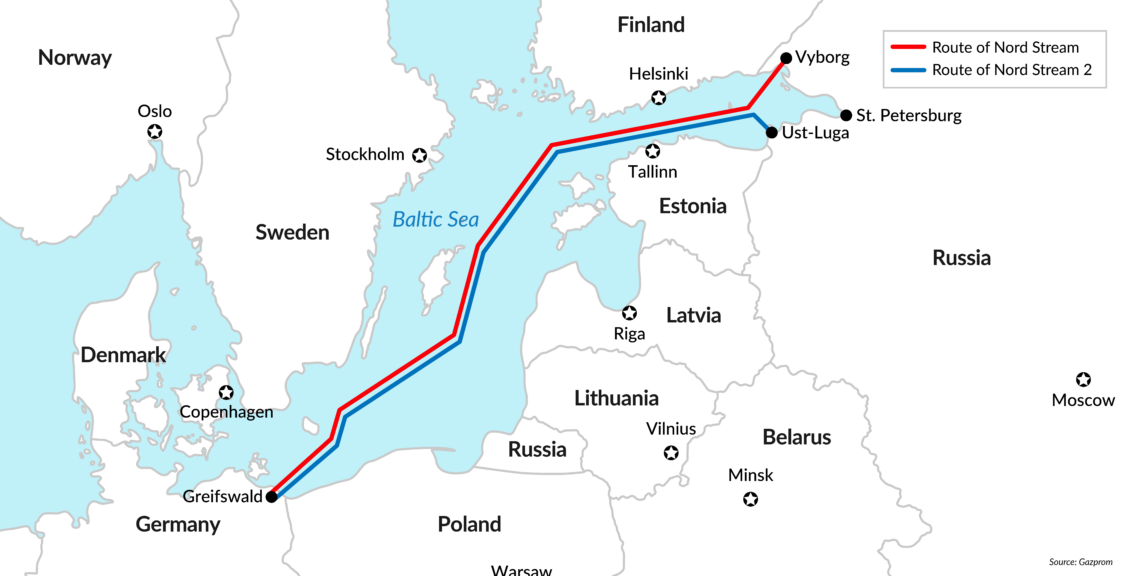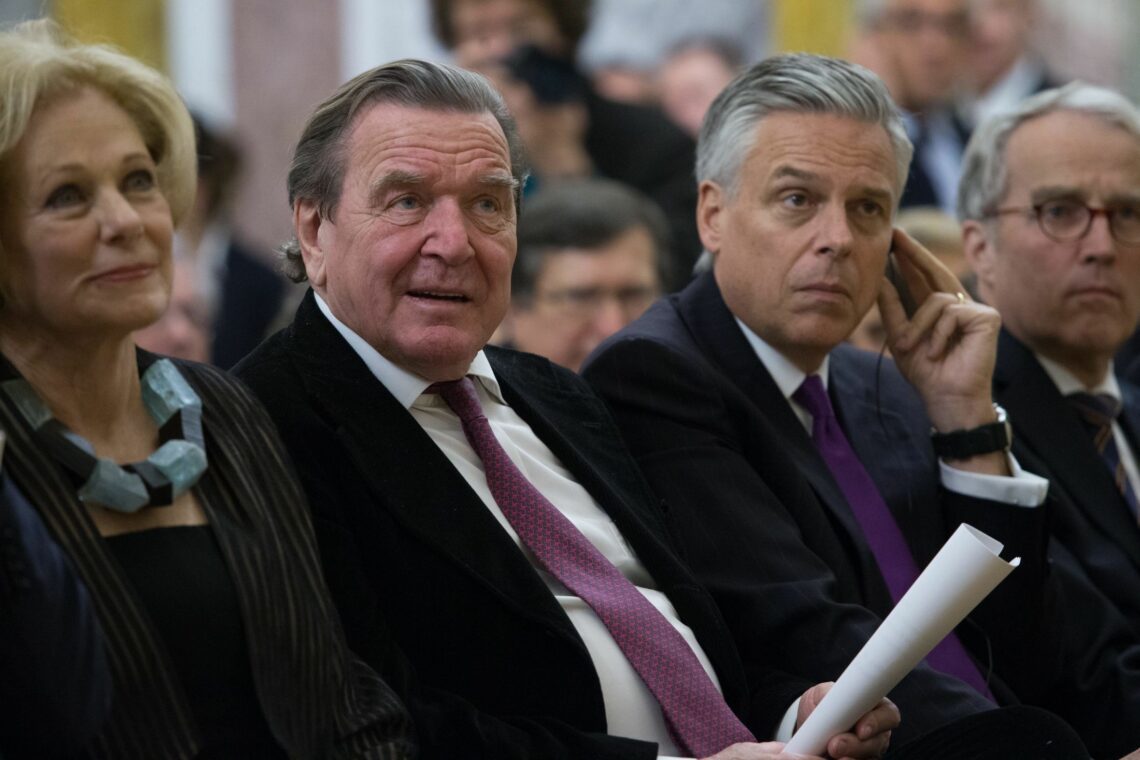Nord Stream 2: The German perspective
Although most parties in Germany’s parliament support the Nord Stream 2 project, there is far from a consensus within the country: even the government doesn’t have a consistent policy. Still, Berlin sees benefits in having access to more gas supply than it needs.

In a nutshell
- Nord Stream 2 makes little economic sense by itself
- It also undermines German criticism of Russian policy
- Yet it offers the prospect of cheaper energy for Germany
An unusual event occurred in the German parliament in early June: the right-wing opposition party “Alternative for Germany” (AfD) put an urgent question on the Bundestag agenda under the title: “securing sovereignty and energy supply – standing against sanction threats involving Nord Stream 2.” It turned out that the AfD stood by the government. Together with all other parties, it condemned the looming American sanctions against businesses involved in the Nord Stream 2 pipeline project. It also became clear that all of the parties in parliament except for the Greens supported the Gazprom project.
It would therefore seem that Germany’s position on Nord Stream 2 is clear and unified. A closer look at the geopolitical and economic aspects of the project, however, reveals a much more muddled picture.
Direct connection
The Nord Stream 2 pipeline will be 1,200 kilometers long and will directly connect western Russia near St. Petersburg with Greifswald in northeastern Germany. The line would deliver Russian gas across the Baltic Sea, mostly following the same route of the existing Nord Stream pipeline, which became operational in 2011.
Facts & figures
Nord Stream 2
- Length: approx. 1,230 kilometers; two parallel lines on the seabed
- Total capacity: 55 bcm of natural gas per year (27.5 bcm per line)
- Shareholder: Gazprom
- Financial investors: ENGIE S.A., OMV AG, Royal Dutch Shell plc, Uniper SE and Wintershall Holding GmbH. Each company will fund up to 950 million euros
- Overall costs including financing costs: around 9.5 billion euros
Source: Gazprom
The project’s sole shareholder is the Russian state-owned company Gazprom, which is covering half of the pipeline’s 9.5-billion-euro price tag. The other half is being financed by five European energy companies: Germany’s Uniper and Wintershall, Austria’s OMV, British-Dutch Shell and France’s ENGIE.
Nord Stream 2 could double the amount of gas Germany imports from Russia. In 2017, Germany consumed a record 53 billion cubic meters of Russian gas, accounting for about 40 percent of the total gas it used. Together, the two Nord Stream projects could cover around a quarter of Europe’s current gas demand. But that figure could also end up being much lower, if other sources become more easily available and more competitively priced.
Nord Stream 2 makes it much easier for Moscow to shut off existing pipelines through Central and Eastern Europe.
Nord Stream bypasses countries such as Slovakia, Poland and most importantly Ukraine, potentially significantly reducing the gas transit fees these countries will collect. Russia will be able to deliver gas directly to its most important buyer, Germany, making it much easier for Moscow to shut off existing pipelines through the region.
Technically, Nord Stream 2 could be completed by the end of this year. Legally and politically, however, there are big barriers that will certainly cause delays.
Legal hurdles
Permits to build the pipeline through Danish waters are still pending. In 2017, Denmark passed a law allowing it to ban the pipeline from passing through its territorial waters on security grounds. The Danish elections in early June were won by the Social Democrats, led by Mette Frederiksen. They faced tough negotiations to form a minority government that is backed by parties with conflicting views on environmental, economic and immigration policy. Meanwhile, Gazprom has proposed an alternate path that would route the pipeline through the waters of Denmark’s exclusive economic zone but not its territorial waters. It is impossible to predict how the new government will react. The only safe prediction: more delays.
Nord Stream 2 faces an even bigger legal hurdle: earlier this year (and against fierce German resistance), the European Union passed an amendment to the 2009 EU gas directive, applying the bloc’s internal gas-market rules to pipelines to and from third countries like Russia.
As a result, Gazprom will be able to deliver gas via the Baltic Sea directly to Germany, but could be required to “unbundle” ownership of the pipes and the supply of gas. If that were to happen, it would likely have to sell the pipeline to a third party, allowing access to competitors and reducing its ability to offer favorable rates to friends and higher prices to foes.
Facts & figures
Transit-country bypass
Routes of Nord Stream and Nord Stream 2

There is some debate about whether the new rules apply to Nord Stream 2. Some legal experts argue that applying the directive would be discriminatory and retroactive, and thus against the rule-of-law standards the EU tries to uphold. The amendment came into force on May 23 this year. Nord Stream 2 advocates argue that the pipelines had been completed in German territorial waters by that date. But, as pointed out above, it has not been given permission in Danish waters and hence on some EU territory.
It is also debatable whether U.S. sanctions against Nord Stream 2’s investors could stand up under international law. Most of the contracts have already been signed and most of the costs are already “sunk” (both nominally and literally). On the other hand, sanctions have not yet even been declared.
The Ukraine question
Once Nord Stream 2 becomes operational, Ukraine’s gas delivery system may no longer be needed to transport Russian natural gas to EU countries. In that case, the government in Kiev would not only have to forfeit transit fees of around $2 billion per year, it would also lose political leverage with Moscow.
Gazprom has contractual obligations to EU customers that it must meet, whether or not Nord Stream 2 is operational.
Yet European Commission experts expect the project’s deadlines to slip, forcing Russia to continue pumping at least some gas via Ukraine. Gazprom has contractual obligations to EU customers that it must meet, whether or not Nord Stream 2 is operational. That could give both the EU and Ukraine better bargaining chips to soften the blow of Nord Stream 2.
The German (counter-)argument
From the very beginning, the German government downplayed Nord Stream’s geopolitical dimension and the damage it could do to the country’s image as a voice of multilateralism and European solidarity. Germany’s “special relationship” with Russia when it comes to gas started with a very peculiar episode. Just weeks after German Chancellor Gerhard Schroeder lost the 2005 elections, his government, still in office, awarded Nord Stream a 1-billion-euro loan guarantee. Although the guarantee was never used, it raised questions about a conflict of interest: soon after, Mr. Schroeder was named head of Nord Stream’s shareholder committee. In 2016, he became manager of Nord Stream 2.
Over the following years under Chancellor Angela Merkel, the Nord Stream projects were presented merely as bilaterally beneficial business ventures. After all, even the Soviet Union had reliably provided gas to West Germany during the Cold War era, since Moscow was more dependent on exporting gas than Germany is on Russian deliveries. That dependence remains today.
At the same time, with European gas fields nearly spent and Germany phasing out both nuclear power and coal, the country needed a reliable source of energy to ensure supply and facilitate its long-term shift to renewable sources.
Moreover, Berlin has always said that its approval of Nord Stream 2 is conditioned on gas transit to the EU via Ukraine remaining largely intact (with at least 15-20 bcm per year). This stance was meant to lend support to the European Commission as it tries to find a solution to the Russia-Ukraine conflict.
Still, Germany can be accused of a double standard: in early 2015, Berlin was at the forefront of imposing EU-wide sanctions against Russia, causing southeastern EU nations to abandon plans for a rival South Stream pipeline. Yet Berlin continued with the Nord Stream 2 project.

The surprisingly strong support for Nord Stream 2 in the German parliament does not indicate any consensus on Russia or on energy policy. Not even the German government has a consistent Russia policy: it supports sanctions against Russia on a multilateral level, and pursues bilateral energy deals with Russia against the EU and most member states’ policy. Moreover, it is engaged in a unique and costly energy policy transition (phasing out both nuclear and coal) unilaterally without consulting its European partners.
Already at the national level, a complex negotiation process is going on. Chancellor Merkel needs to convince reluctant Social Democrat coalition partners in her cabinet to support the sanctions against Russia; Nord Stream was a suitable part of the package deal, especially since it creates jobs in the northeastern parts of Germany that are governed by pro-Russian Social Democrats.
Even within her own conservative party family, there is no unity. In early June, the Christian Democratic Union (CDU) Minister-President of Saxony Michael Kretschmer openly declared that sanctions against Russia should be scrapped. On the other side, Manfred Weber, a leading conservative German member of the European Parliament, made it clear that if he becomes President of the European Commission he would take legal steps to stop Nord Stream 2.
Germany’s Russia policy depends on the audience: whether a member even of the same party caters to a local (eastern German) or a European electorate. Nord Stream 2 is much more than a purely economic enterprise. It is deeply political. But even the economics is not as plain as it might seem. Does Nord Stream 2 make economic sense?
The economics of Nord Stream 2
If the geopolitics of Nord Stream 2 is unclear and messy, so is the economics. A recent study published by the renowned German Institute for Economic Research (DIW) came to the damning conclusion that “Nord Stream 2 is unnecessary from an energy economic perspective, bad for the environment, and economically unprofitable.”
The economists predict that German demand for natural gas between 2008 and 2050 will decrease by almost 73 percent.
The DIW economists predict that between 2008 and 2050, German demand for natural gas in the energy, heat and industrial sectors will decrease by almost 73 percent. This projection is based on a somewhat optimistic long-term account of Germany’s climate policy, especially that it will make rapid progress in developing renewable energy and storage capacities, and will make big strides in energy efficiency.
Based on different assumptions, the EU Reference Scenario used to plan Nord Stream 2 predicted a roughly constant demand for natural gas in Europe. In terms of supply, European production (in Norway, and particularly in the United Kingdom and the Netherlands) is expected to decline. Yet imports of liquefied natural gas (LNG) – mainly from Africa, South America or the U.S. – could make up the difference. Germany has no LNG terminals, but it intends to build some and could import gas from other European ports, for example in the Netherlands.
Other economists see a point in having Nord Stream 2, even if it is not vital for ensuring energy security. They expect German gas demand to rise over the next couple of years as the country makes up for phasing out both nuclear energy and coal. Renewable sources and the grids needed to deliver their energy will take time to develop. Wind and solar energy are not always available during peak demand. It is therefore in the interest of both Germany and Europe to meet that demand through a variety of channels. Germany could even become a major hub for Russian gas; its neighbors – including Poland and even Ukraine – could benefit from lower prices on an oversupplied market.
A government spokesman recently pointed out that the completion of Nord Stream 2, along with other pipelines, storage capacities, EU production and LNG terminals, would give Germany access to sources of supply equal to 200 percent of its annual gas demand. Nord Stream 2 by itself would account for 10 percent of that total. Hence, the new pipeline would not make Germany dependent on Russian gas but would in fact increase Germany’s and Europe’s “sovereignty.” By increasing diversification of potential sources of supply and by creating potential oversupply, the German (and European) gas market would become a buyers’ market. German consumers in particular would welcome cheaper energy: the costs per megawatt hour for German households and business are among the highest in the world.
Still, Gazprom has invested in a very economically unprofitable pipeline. The DIW study, as well as studies from the Russian investment bank Sberbank and from a Norwegian research group, all come to that conclusion. They add investment in an additional supply pipeline on Russian soil and higher transportation costs for undersea delivery to Nord Stream 2’s price tag. They also assume that the pipeline will only operate at 60 percent capacity due to subdued demand. Even after including the savings from not having to pay transit fees to Ukraine, they calculate the loss on the investment at around 5 billion euros.
Russia’s political economics
From Russia’s perspective, Nord Stream 2 was never a purely economic undertaking. It and another pipeline, TurkStream, are meant to make the Ukrainian transit system superfluous, undermining Ukraine’s ability to bargain with Russia and punishing it for its pro-EU stance.
In addition, the infrastructure projects and building contracts stabilize Russian President Vladimir Putin’s political-economic rent-seeking system. It can safely be assumed that the Russian firms involved in construction are owned by people close to President Putin and generate additional profit from these projects. That strengthens a system of loyalty where private profit outweighs the overall economic cost.
What now?
Nord Stream 2 will likely be completed. The length of the delay depends on the legal and political hurdles. Economists have estimated that delays could cost the project some $20 million per day, based on global gas market developments, especially in the LNG sector.
This pipeline is not about economic efficiency. It is about political power.
But this pipeline is not about economic efficiency. It is about political power. Gazprom and the Russian government are ready to incur economic losses for more strategic leverage – which they hope will translate into more economic power in the long run. This combination of geopolitics and economics is not exclusive to Russia. Most countries employ such strategies, especially China and the U.S.
Will U.S. sanctions have an impact? In Germany and Europe, experts expect that U.S. sanctions are unlikely to stop the pipeline’s technical completion: Gazprom is able to foot the entire bill. But they may cause limits on the pipeline’s utilization, further limiting its economic benefit, at least for Russia. As with the Danish and EU legal hurdles, U.S. sanctions might cause costly delays. Moreover, the sanctions, especially combined with the oversupply being pumped into Europe’s market, are likely to keep Gazprom from using the pipeline at full capacity.
Nord Stream 2 therefore shows how economics informs geopolitics, but geopolitics trumps economics. Germany’s perspective is necessarily difficult and complex in this respect. Economically, the pipeline offers the prospect of higher energy security at lower cost – badly needed for a country engaged in a costly, but morally seductive energy transformation.
Nord Stream 2 certainly weakens Ukraine and thus bolsters President Putin’s war efforts against that EU-friendly country. It contradicts the German leadership’s support for upholding economic sanctions against Russia. And it makes U.S. President Donald Trump angry. The latter argument offers some disturbing context. According to a Pew Research poll, Germans have very little, but still more trust in Vladimir Putin than they have in Donald Trump.
The debate in the Bundestag on Nord Stream 2 gave the impression that Donald Trump’s threats involving Nord Stream 2 may have backfired in Germany. Any other U.S. president – with more goodwill and using different rhetoric, but still making the same geopolitical point – could have led many Germans to reconsider the geopolitical costs of Nord Stream 2. But here we are: politics is driven by emotion.








